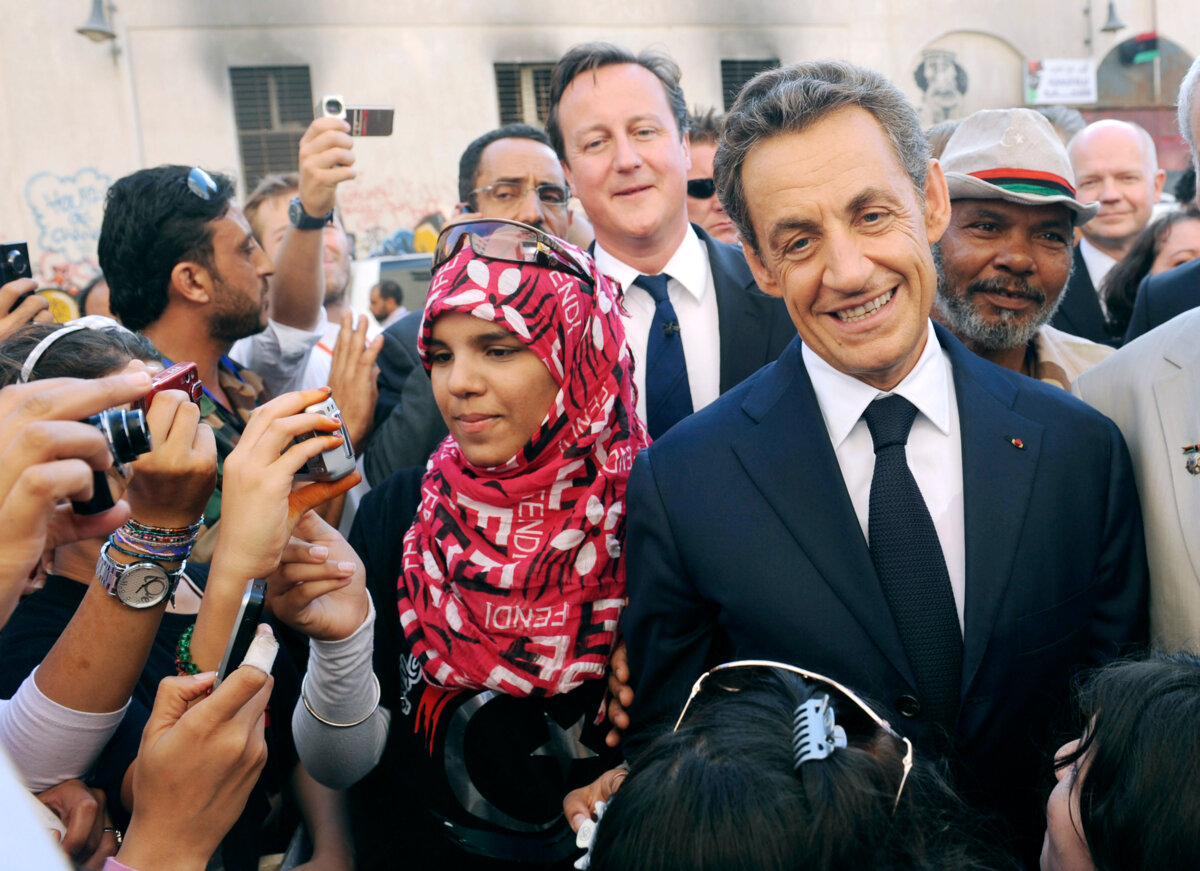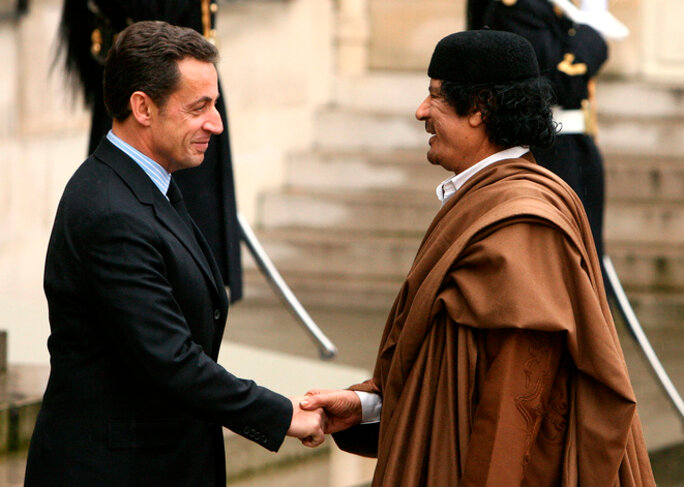A report published this week by the British parliament’s foreign affairs committee presented its scathing findings on the military intervention by France and Britain in Libya in 2011.
The report, released on Wednesday and which in effect echoed US President Barack Obama’s description of the operation as “a shit show”, slammed decisions made without “accurate intelligence” and any coherent strategy, and in its conclusions said “UK policy followed decisions taken in France”. The committee was damning of former British prime minister David Cameron who is painted as blindly pursuing a military campaign led by France, and who ignored the opportunity to “pause military action when Benghazi was secured in March 2011”.
The intervention ended in October 2011, after the death of Muammar Gaddafi, before the country descended into political chaos, divided into regions controlled by rival militias and now, five years on, providing a base for the Islamic State group.

Enlargement : Illustration 1

The aerial campaign, accompanied by missile attacks, was officially a NATO-led operation, authorized by the United Nations Security Council to protect Libyan civilians during the uprising against the regime of Muammar Gaddafi, which began in earnest in the eastern port of Benghazi in February 2011.
In the run-up, during February and March 2011, to the UN resolution 1973 on March 17th authorizing the campaign, “France led the international community in advancing the case for military intervention in Libya” noted the British parliamentary report. Then-French president Nicolas Sarkozy had largely justified the military intervention by the threat posed to the civilian population in Benghazi by Gaddafi’s air force, an argument which the committee found was overstated.
“Looking beyond the arguments advanced in the United Nations Security Council, other factors in addition to civilian protection appeared to influence French policy,” the committee’s report says. “Libyan exiles based in France were influential in raising fears about a possible massacre in Benghazi. Visiting Professor at King’s College London, Professor George Joffé, told us that “the decisions of President Sarkozy and his Administration were driven by Libyan exiles getting allies within the French intellectual establishment who were anxious to push for a real change in Libya.”
“A further insight into French motivations was provided in a freedom of information disclosure by the United States State Department in December 2015,” the report continues. “On 2 April 2011, Sidney Blumenthal, adviser and unofficial intelligence analyst to the then United States Secretary of State Hillary Clinton, reported this conversation with French intelligence officers to the Secretary of State: ‘According to these individuals Sarkozy’s plans are driven by the following issues:
a. A desire to gain a greater share of Libya oil production,
b. Increase French influence in North Africa,
c. Improve his internal political situation in France,
d. Provide the French military with an opportunity to reassert its position in
the world,
e. Address the concern of his advisors over Qaddafi’s long term plans to supplant France as the dominant power in Francophone Africa’.”
The British MPs concluded: “The sum of four of the five factors identified by Sidney Blumenthal equated to the French national interest. The fifth factor was President Sarkozy’s political self-interest.”
But another consideration looms large in any analysis of the motivations behind what became the fiasco of the intervention in Libya, namely the suspected corrupt dealings between Nicolas Sarkozy’s political camp and the Gaddafi regime.
As Mediapart has already reported at length, Sarkozy and Gaddafi maintained a compromising political and diplomatic relationship between 2005 and 2011, before and after Sarkozy’s election as president in 2007, and a French judicial investigation is now examining whether his 2007 election campaign was in part funded by the late Libyan dictator.
In April 2012, Mediapart revealed the contents of an official document from the Gaddafi regime detailing an agreement to provide 50 million euros for the Sarkozy election campaign. Sarkozy launched a lawsuit against Mediapart for “forgery” and “use of forgery”, and the subsequent judicial investigation, which called on numerous expert appraisals, in June finally threw out the complaint, finding no grounds for challenging the authenticity of the document. Sarkozy has appealed the decision.
Meanwhile, Claude Guéant, one of Sarkozy’s closest allies, who served as his chief-of-staff during his ministerial career between 2002 and 2007, and later when Sarkozy became president, is currently placed under investigation over a mysterious payment of 500,000 euros made to him in 2008. Guéant initially argued that the money came from the sale to a Malaysian lawyer of two 17th-century oil paintings, before the investigation established that the money was in fact sent from an account in Saudi Arabia belonging to Saudi businessman Khalid Ali Bugshan. The person believed to have made the order for the payment is Wahib Nacer, a financial advisor for the Bugshan family and who was also manager of bank accounts belonging to Bashir Saleh, former head of the Libyan African Portfolio (LAP), one of the main investment arms of the Gaddafi regime.
Putin tells French PM: 'You killed Gaddafi'

Enlargement : Illustration 2

The question raised today is whether Sarkozy’s suspected financial dealings with the Gaddafi regime and the threat of their exposure lies behind the former French president’s zeal to topple the dictator in 2011. While by no means providing a clear answer to that question, a study of the chronology of the French intervention in Libya is instructive.
The first major civil rebellions against the Gaddafi regime began in February 2011. On March 5th 2011, Ziad Takieddine, a Paris-based arms broker and businessman who served as an intermediary for Sarkozy’s dealings with the Libyan dictator, travelled by private jet to Tripoli. He was accompanied by a French journalist from the weekly Journal du dimanche who was due to interview Gaddafi. On Takieddine’s return to France, customs officers at Le Bourget airport found he was carrying 1.5 million euros in cash. It has still not been established what the sum was intended for.
Five days later, on March 10th, Gaddafi issued a warning via the official Libyan news agency LANA. “A grave secret will lead to Sarkozy’s downfall,” said Gaddafi, “even a judgment linked to the financing of his electoral campaign.”
On March 15th, in an interview with French daily Le Figaro, the dictator elaborated further. “My dear friend Sarkozy has a mental disorder,” he told the paper. “It’s me who made him come to power. We gave him the necessary funding so that he could win the election […] He came to see me, in this tent. He asked us for a sum, we gave the sum to him. For us, as Libyans, if the president of the French republic wins the elections thanks to our funds, it’s a true benefit.”
On March 16th, Gaddafi’s son Saif al-Islam was asked in an interview with TV channel Euronews: “What is your position on France and President Sarkozy? France was the first country to recognise the [rebel] Provisional Council.” Saif al-Islam replied: “Firstly Sarkozy must repay Libya the money he took for his election campaign. We financed his election campaign and we have all the details and we are ready to publish them. The first thing we ask of this clown Sarkozy is that he repay this money to the Libyan people. We helped him become president so that he would help the Libyan people but he has disappointed us. And very soon we will publish all the details and the documents and banking pay slips.”
The very next day, March 17th, France obtained the backing of the UN Security Council for intervention in Libya, despite the fact that one week earlier the African Union had proposed a peace initiative to obtain a diplomatic solution to the crisis in Libya.
While the UN resolution allowed for the setting up of a no-fly zone over Libyan airspace, numerous sources in French intelligence, echoed by press reports in France, have since spoken of French special agents being sent to Libya to work on the ground. But for what reason?
In an interview published in March 2015 in French magazine Society, Sarkozy’s prime minister François Fillon, who served throughout the former president’s five-year term, recounted an anecdote during the 2011 intervention: “I remember a very violent discussion with [then Russian prime minister Vladimir] Putin. ‘I will never believe you again,’ he said. ‘You fooled me once, it’s all over’ […] ‘You killed Gaddafi’ […] In short, he gave me a whole demonstration, the French planes that block Gaddafi’s column, the special forces on the ground. Even if it was not us who pulled the trigger, honesty requires me to say that his arguments were not all false.”
No parliamentary enquiry into the 2011 military intervention in Libya has ever been created in France. Socialist Member of Parliament Nicolas Bays called for one, in November 2014, when he wrote to the speaker of the lower house arguing that “given the clear involvment of France in the fall of the Libyan regime […] it is legitimate to question the nature of the relations between the French republic and the regime of Muammar Gaddafi during the period 2007-2011”. His move was in vain.
-------------------------
- The French version of this article can be found here.
English version by Graham Tearse



